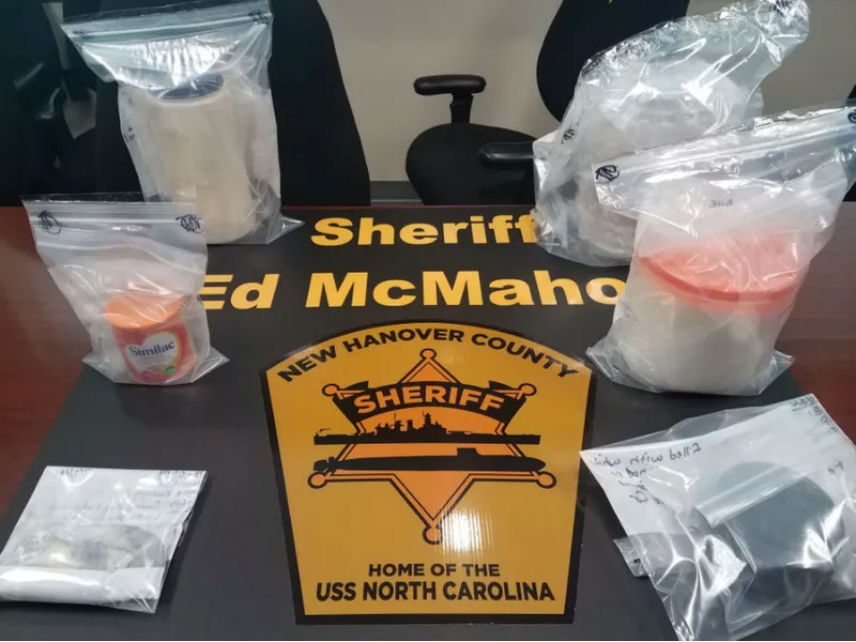Huge North Carolina Fentanyl Bust Turns Out To Be 13 Pounds of Sugar
The New Hanover County Sheriff's Office made a mistake.

In July, New Hanover County Sheriff's Office (NHCSO) made a big fuss about a huge fentanyl bust.
Sheriff Ed McMahon proudly boasted "one of the largest seizures in the state" after the NHCSO's Gang Task Force seized an estimated $2 million worth of 'the deadly opioid fentanyl' during a raid. Three Wilmington residents were arrested as a result. "When you think about this poison—this fentanyl—one grain can kill you," McMahon said. "Our detectives are having to gear up with all this safety equipment before we go in. Once they get in, if we find something—any kind of drugs that we think may be fentanyl—we stop, we have to get our CSI team to come in and we test that in a lab now under special conditions. So we do all that, it makes it that much more dangerous for our local law enforcement officers."
Months after McMahon made his alarming statements, Lt. Jerry Brewer announced that a private lab found the "fentanyl" was actually "a combination of simple and complex carbohydrates." In other words: sugar.
The false positive came from a field test kit used by CSI in the bust. The field test kit was invented and administered by Scott Company Drug Testing, which was founded by a retired DEA agent and forensic chemist. According to its website, the field test kit uses "reagents that have held up in court since 1978." The company also assures the integrity of officers and their investigations. Despite this promise, Brewer confirmed that it was in fact possible for the field test kit to make false identifications of fentanyl, as it had in this case.
In a four-page release to WECT, the company said, "Under certain circumstances, sugar substances can mimic a false positive result." The company also stated that it would be providing more training about the nature of "presumptive tests," on which the kit relies, and confirmatory tests, which uses additional measures to make conclusions about a substance.
This is not the first time a false positive in a field test kit led to a drug arrest. A 65-year-old retiree, Daniel Rushing, was awarded $37,500 from the city of Orlando, Florida, after being pulled over in a traffic stop by police. An officer used a field test kit to test the white substance present in his vehicle. After officers first tried to identify the substance as crack cocaine, they eventually arrested Rushing for the possession of methamphetamine "with a weapon," despite the fact he legally possessed a concealed carry in his vehicle. A lab test later revealed that the suspicious white substance was glaze from the doughnuts Rushing ate in his vehicle.
Editor's Note: As of February 29, 2024, commenting privileges on reason.com posts are limited to Reason Plus subscribers. Past commenters are grandfathered in for a temporary period. Subscribe here to preserve your ability to comment. Your Reason Plus subscription also gives you an ad-free version of reason.com, along with full access to the digital edition and archives of Reason magazine. We request that comments be civil and on-topic. We do not moderate or assume any responsibility for comments, which are owned by the readers who post them. Comments do not represent the views of reason.com or Reason Foundation. We reserve the right to delete any comment and ban commenters for any reason at any time. Comments may only be edited within 5 minutes of posting. Report abuses.
Please to post comments
>>>According to its website, the field test kit uses "reagents that have held up in court since 1978.
Because they were scientific and accurate, or because they were useful?
Because they led to arrests and convictions (and the occasional asset forfeiture windfall).
Yep.
Well sugar is deadly too so it wasn't a total waste
It will end up going to a total waist. 🙂
Lots of pols want to regulate sugar. Sheriff Ed McMahon (really??) should be given a medal for getting ahead of this scourge.
I'll buy that for a Dollar... per pound.
Look at the way the company phrased it: "Under certain circumstances, sugar substances can mimic a false positive result."
It's not the company doing anything, it's that sneaky sugar mimicing illegal drugs.
certain circumstances == real world conditions.
And just how do you mimic a false positive? If your test says sugar is fentanyl, that is a false positive result.
Props on using real sugar rather than high fructose corn syrup
What kind of cop can't tell meth from donut glaze?
To be fair, donuts are like crack to many LEO's.
The ones who line up outside donut shops at the beginning of their shift. You just ASSUME they are pigging out on donuts. When in fact they are preparing to go undercover for their anti-meth work and ensuring that they have flecks of donut glaze legal meth on them to enhance their cover
Well, in this case they would have been arrested anyway for all the real heroin they had and had been selling to informants. The "13bs of sugar" was probably mannitol so this isn't one of those cases of cops busting somebody for soap or donut glaze.
With all those stars on his collar and a chestful of ribbons, this sheriff is a proven hero. Let's give him a fifth star for keeping these obesity-causing drugs off the street!
Notice how all these hick sheriffs begin to resemble dictators from third world nations?
When is Ed McMahon going to beg forgiveness for incompetence and wasting taxdollars?
HEY-OOOOO!!
Defense attorneys need to bring this up every time these bastards testify in court about their 'elite training ' and 'years of experience'.
https://bit.ly/2wvHplL